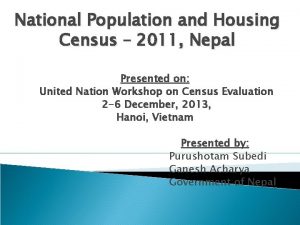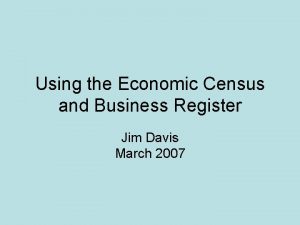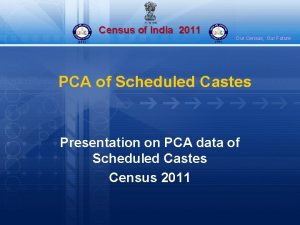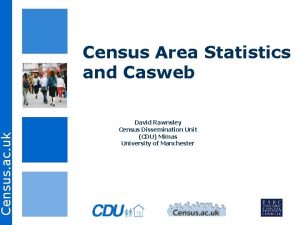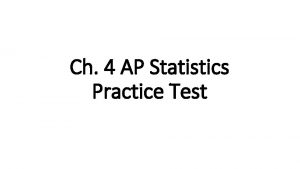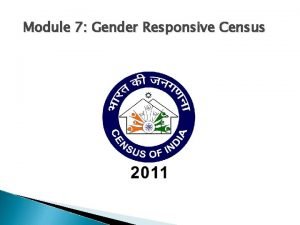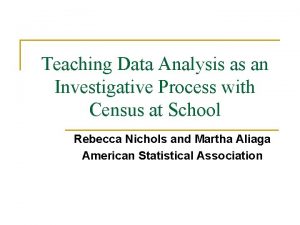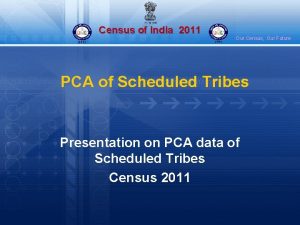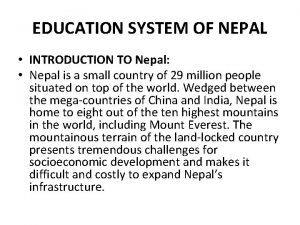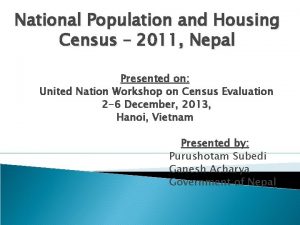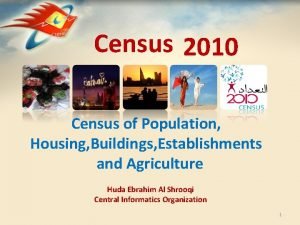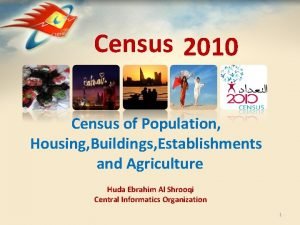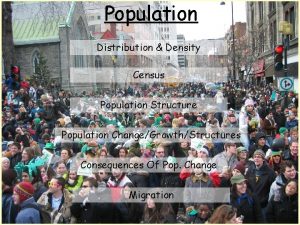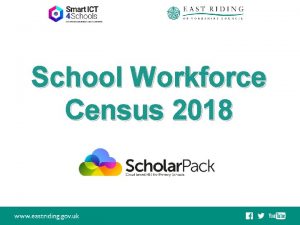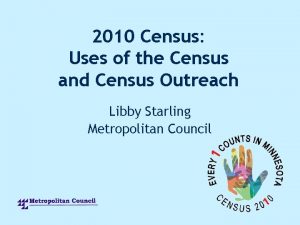POPULATION HOUSING CENSUS OF NEPAL AN EXPERIENCE OF


















- Slides: 18

POPULATION & HOUSING CENSUS OF NEPAL: AN EXPERIENCE OF OUTSOURCING REGIONAL WORKSHOP ON CENSUS DATA PROCESSING 15 -19 September, 2008 Bangkok, Thailand Bharat Sharma Nepal

Background Information q The statistical system of Nepal is decentralized. q Censuses and large-scale surveys are conducted by the Central Bureau of Statistics (CBS) while the current statistics are generally collected by respective ministries, departments and agencies. q Of all the censuses and surveys, the most crucial statistical activity to provide benchmark of population - its distribution growth and their socio-economic characteristics at the lowest level of administrative unit is population census.

Background Information q Central Bureau of Statistics at present, is responsible for conducting population censuses. q Population censuses are the main sources of data that can provide the state of population at a specified time. q The first population count was undertaken in 1911 in Nepal. q Since then, the process has been continuing in every ten -year. q The 2001 Population Census was the tenth in a series of these censuses.

Background Information q Preparations for the coming 2011 census are already underway which marks one hundred years of census taking in Nepal. q Four censuses taken before the 1952/54 census are known as “head counts”. q The earlier censuses of Nepal were not that precise as compared to the modern censuses. q The 1952/54 census was taken in two parts of the country in two different years. q A synchronized census was taken in 1961. q After 1961, a census has been taken in every ten years.

Data Processing/ Database Management q. Censuses up to 1961 were manually processed and tabulated. q. The computerized processing and tabulations were done only from 1971 Census. Data capturing process is still manual. q. At present the CBS has a small in-house data processing unit capable of processing and analyzing small scale survey data.

Data Processing/ Database Management q. CBS has been relying entirely upon the National Computer Centre (NCC) for the data entry, processing and analysis of census data in the past since 1971 to 1991. q. In 2000, government of Nepal collapsed the NCC. q. The 2001 Population Census data was processed analyzed at the Central Bureau of Statistics, which contributed towards institutionalization and sustainability of the data processing job in the Bureau.

Outsourcing q Due to the limited physical facilities like space, computers and personnel that were available at the CBS, data entry along with coding and editing works of the 2001 census questionnaires was outsourced to two private agencies. q For the selection of private parties criteria were prepared by the Bureau. q The bidder parties were visited for checking physical capacity like number of micro-computers and space available and the parties were short listed. q Financial proposal was called from the short listed (or prequalified) parties and finally two parties were selected for the job. q Due to bureaucratic processes the data entry work was delayed for about 45 days from the originally planned schedule.

Monitoring & Supervision q Two Statistical Officers were deputed in each of the data entry centers to supervise and monitor the data entry work and report to the data processing expert stationed in the Bureau. q The data entry progress was regularly updated and briefed to the Population Census Section Chief who ultimately briefed the Director General of the Bureau with all the latest updates. q Data were transmitted daily from data entry points to the CBS. q Data entry programs were provided by the CBS. q The data verification was done by the contractor first and then re-verified and supervised by the CBS.

Monitoring & Supervision q Data editing and coding manuals were developed in the CBS and given to the parties doing the data entry work. q Due to the large volume of editing and coding to be done, skipping of editing rules and miscoding of data field was found frequently. q So the CBS had to seriously monitor the editing and coding work. Such type of errors was discouraged by the central supervision. q One party worked in three shifts while the other one worked in two shifts. q Both the parties worked 12 to 14 hours per day. q Nearly 400 coding and data entry operators were hired and trained by private parties for the job. q The data entry work was completed within a period of 5 months.

Monitoring & Supervision q For the data entry program, the CBS personnel provided training for the supervisors and supervisors later gave training to the operators. q Data were entered in the networking environment. All terminals were linked to file servers and access security was maintained. q It was found in some cases that some operators tend to skip field to increase the number of records entered. q Such operators were fired and the program was modified to minimize this type of error.

Data Processing/ Database Management q A census data processing unit was established at the Population Section of the CBS with one data processing expert, two statistical officers and two subordinate staffs in system design and programming under the supervision of the Deputy Director of the Section. q For data processing and tabulations, the CBS used one Pentium IV, four Pentium III along with two high speed laser printers and one dot matrix printer in Windows NT under Local Area Network environment. q The data processing expert was made available by the UNFPA for all these purposes.

Data Processing/ Database Management q Data from private parties were transferred to the CBS through dial modem and later on through CD-ROM also. q At the CBS basically two types of check were done: completeness of data and accuracy and consistency of data. q The number of missing wards was determined after a thorough check of the questionnaire for each ward. q Data from private parties were transferred to the CBS through dial modem and later on through CD-ROM also. • At the CBS basically two types of check were done: completeness of data and accuracy and consistency of data.

Data Processing/ Database Management q The number of missing wards was determined after a thorough check of the questionnaire for each ward. q Nearly two percent of the entry completed questionnaires were verified. q During verification, if the percentage of error found was higher than the tolerance limit then the data entry work was repeated in such wards. q In this process, supervisors had to physically check the questionnaires.

Software used q Integrated Microcomputer Processing System (IMPS) was used for data entry, editing, verification and management of census data. q STATA and SPSS Software Packages were used for the tabulation of the census q Report designing and layout on MS Office (like Excel and access).

Lesson learnt/Issues/Challenges of outsourcing of Data keying q Census results was produced much faster (Data entry was completed within 5 month) and more economically than in the past censuses, might also be due to new technology and high speed computer facilities. q Reduces the cost of human resources, because permanent staffs will not need for coding, editing and data keying.

Lesson learnt/Issues/Challenges of outsourcing of Data keying q More attention should be given for selecting private parties; institutional capacity, available space, manpower etc q Strong monitoring and supervision mechanism will be needed, in some cases careless of coder, editor and data entry operator was found. q Coder, editor and data entry operator might not be professional or familiar with data, so intensive training will be needed. q Very clear coding, editing and data entry manual should be developed.

Lesson learnt/Issues/Challenges q Consistency check and data verification mechanism should be strong. q The data entry centres should linked with the Data Processing Unit, through appropriate communication links and modem, which facilitate for verification.

THANK YOU
 National population and housing census 2011
National population and housing census 2011 Imprinting psychology
Imprinting psychology Early experience vs. later experience
Early experience vs. later experience Indirect experience
Indirect experience Chapter 4 population ecology test answer key
Chapter 4 population ecology test answer key Section 1 population dynamics answer key
Section 1 population dynamics answer key Population ecology section 1 population dynamics
Population ecology section 1 population dynamics Chapter 4 section 1 population dynamics
Chapter 4 section 1 population dynamics Census business register
Census business register Our census our future
Our census our future Casweb census
Casweb census Chapter 4 ap statistics practice test
Chapter 4 ap statistics practice test Http://www.census.gov/popclock/
Http://www.census.gov/popclock/ Gender responsive census
Gender responsive census Census at school random sampler
Census at school random sampler The census form
The census form Our census our future
Our census our future 1940 census.archives.gov
1940 census.archives.gov New york regional census center
New york regional census center
